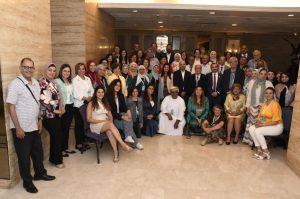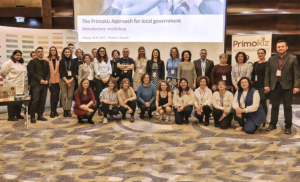ISSA
The power of a network to make a difference for young children: Examples from ISSA
Stronger focus on creating sustainable and supportive environments for young children and their care-givers has never been more crucial. Acting as a catalyst that sparks change within local contexts in Europe and Central Asia, the ISSA Network supports the roll-out of effective solutions to complex problems. ISSA Members have access to the advantages of being part of a network, tapping into mechanisms that suppport resilience and capacity building in times of crisis. This blog shares two of many examples of the ISSA Network’s successful impact in 2023 – ISSA’s roll-out of the Primokiz Programme and the network’s coordinated response to support children and families impacted by the war in Ukraine.
The Primokiz Programme
Last year marked a pivotal moment for ISSA with the successful roll-out of the Primokiz programme in several countries. By working directly with local governments, the Primokiz programme builds a sustainable local infrastructure of knowledge and capacity for developing and implementing responsive and comprehensive early childhood strategies.
At its core, the Primokiz programme is a celebration of local capacity and leadership. Primokiz takes on a highly participatory process rooted in the local context, that mobilizes and connects the political commitment with the local expertise and resources, and the needs of the children and families in the communities. Grounded in key arguments for investing in early childhood services, the Primokiz methodology offers a structured seven-phased process for building local leadership and ownership over the development and implementation of needs-based strategic measures to improve local early childhood services across sectors. The feedback from cities was very positive and showed that Primokiz can have tremendous impact on local-level services for young children.
Here you can find out more about this comprehensive approach.
Ukraine Response
The ISSA Network, bolstered by support from the ECRN Fund, has not only sustained but amplified its role as a hub for knowledge and a bridge of support. The year 2023 was a testament to the network’s collective resilience, marked by a rapid and consistent
response to the war in Ukraine .
As the war moved into its second year, the Secretariat continued to support local member organisations with capacity building, fundraising, and making connections to donors and agencies operating in their areas. Since the first day of the war, the ISSA Network has mobilised to support young children and their families, both in Ukraine and in countries receiving refugees. A key lesson learned from these interventions, is that despite a large mobilisation of resources, it remains challenging to provide immediate and appropriate responses on the ground. Given its available technical expertise, expansive connections and local footprint, the ISSA Network has been able to move quickly to successfully address the needs of children, families, ECD professionals and communities impacted by the war in Ukraine.
On this
page you can find a rich set of resources and materials for those working with children of Ukraine, as well as for parents and caregivers. Available in multiple languages, these resources are relevant to other parts of the world where young children are affected by crisis.
By embracing a multi-sectoral, multi-faceted strategy, the ISSA Network’s efforts extend beyond meeting immediate needs to building robust local communities capable of withstanding future challenges. The ability of ISSA Members to utilize the network's advantage underscores the effectiveness of collective action, facilitating rapid and impactful responses when most needed. The support from the Secretariat in enhancing this resilience and mobilization of capacity underscores a commitment to proactive and participatory action for the well-being of children and families. Countless stories of impact and collaboration inspire ISSA’s further efforts towards creating environments where every child has the opportunity to grow, learn, and thrive.





